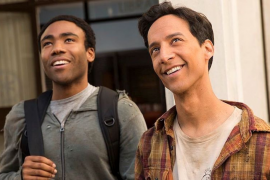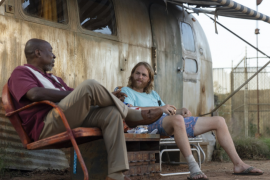DESPITE THE NAME; despite the posters and the DVD covers that depict only its central pairing of Westley (Cary Elwes) and Buttercup (Robin Wright); despite its constant harping on the concept of true love, The Princess Bride isn’t really a romance.
The romance is the MacGuffin. It’s what Westley is seeking from his end, and Buttercup is seeking from her end, and everyone else is caught up in those journeys, either as aid or as obstacle or as both. But there’s not much to it, other than that. Their love is treated as a given; told, by Peter Falk’s narrator Grandfather, rather than shown. In mere minutes, the audience learns how they met, how she treated him like garbage, how he wooed her anyway, and how they separated and their love was doomed, with nary more than an “As you wish” and Elwes’ and Wright’s best looks of longing (which, to their credit, are pretty good) to guide the audience into it.
The rest of the film takes it for granted that these beautiful people would want to be together and so doesn’t bother trying to prove why. The obstacles the pair deal with are almost entirely external: Vizzini’s (Wallace Shawn) kidnapping of Buttercup, the perils of the Fire Swamp, the vainglorious Prince Humperdinck (Chris Saranadon) and the sadistic Count Rugen (Christopher Guest). Yet it’s clear once they’re reunited just as the film turns to its second act that they probably have their own internal stuff to work out too. There is a tension to their scenes on the gorge and inside the Fire Swamp that is never fully resolved. He’s snippy with her, cruel even, unable to hide his feelings of betrayal at her betrothal to the prince. He takes off the mask but can’t drop the facade of casual superiority that he wears as the Dread Pirate Roberts, even once they’re alone. She’s cautious even once she learns his true identity, skeptical that the Farm Boy she fell in love with is still there underneath all that black. They both seem determined to power through regardless, and at the end of the film, they ride off into the sunrise, and share what we’re told is literally the greatest kiss in recorded history. Love conquers all, by blotting out the potential warning signs.
The Princess Bride is a machine for delight, and the love story is the frame that holds that which inspires it together: the comedy, the banter, the torture. Among these elements that spark the joy that has turned the film into an all-time classic is the sort of fully-realized bond that the love story between Westley and Buttercup never becomes: that between Mandy Patinkin’s Inigo Montoya and Andre the Giant’s Fezzik.
At heart, Inigo and Fezzik are a pair of work friends who have found their way into becoming best friends. The audience doesn’t see the beginning of their relationship but can imagine how naturally it must have come. Think of the rapport they each develop in mere minutes with Westley, how they each open up to him, joke with him, and treat him as a worthy colleague even though their business happens to be trying to kill each other. Imagine how easy that might have been to do with someone you knew was on your side, especially someone who’s working for the same high-strung egomaniac as you.
The warmth and care of Inigo’s and Fezzik’s friendship is evident from the first moment they’re together, or at least the first moment that’s unmediated by Vizzini’s cruelty and vocabulary. Their boss has been chastising them as they prepare to launch their ship with the kidnapped Buttercup, fairly typical “villain berates his henchmen stuff, though every Bond villain in history wishes he had a line in his pocket as cold-blooded as the “Unemployed? In Greenland?!” he finishes Fezzik off with.
It’s clear the hurt is real for Fezzik, and most movies would stop once that injury is conveyed: the gentle giant, under the thumb of the Napoleonic taskmaster. Instead, Inigo senses the wound –– director Rob Reiner actually includes a shot of him noticing –– and refuses to let it fester. Never mind that Vizzini has just called Inigo a drunk and a sod; these don’t hit him in quite the same way. He’s not as vulnerable because he knows the insult can be true. It’s a function of his own frustrated purpose, that he cannot find Rugen, the six-fingered man who killed his father. He drinks to slake his thirst for revenge.
Patinkin pulls off both Inigo’s accent and the wavy shag of his Musketeer’s haircut with equal aplomb. His gestures and reactions are perfect, from the little head shake he gives when he tells Westley “I hate to kill you” to the way he scrunches up his face to ask him “Who are you?” once he realizes he’s not going to win their duel. He practically vibrates with impatience at times. But a deep dive isn’t necessary to understand how good he is in the part. The best example of his talent is his most famous line, the four sentence, thirteen-word monologue that is the one thing just about everyone takes away from the movie, in no small part because it is so often repeated: “Hello. My name is Inigo Montoya. You killed my father. Prepare to die.” Because on the page it’s nothing. From the mouth of nearly anyone else it might have been nothing. The sentiment is hardly unique; change the name and it could be said by everyone from Hamlet to Vito Corleone to Arya Stark to Star Fox. When people repeat them, they aren’t really quoting the words; they’re quoting Patinkin’s conviction saying them (and, fine, yes, his accent), the barely-suppressed anticipation his delivery carries whether he’s demonstrating the line for Westley on the clifftop or actually saying it to Rugen in the castle, finally released from all that waiting. Every time he says it, he and the audience can sense the catharsis that it’s one day going to bring him, and that’s why it feels so good to say even for those of us whose fathers were not slaughtered by six-fingered men.
But Inigo is not drunk all the time. Not when he can find some other purpose to temporarily distract him from the big one. Here he has a job, and it’s not just kidnapping princesses in order to start wars. He has to take care of Fezzik. And so he sidles up to the big man and begins what’s clearly a new round of an old pastime of theirs, playing the straight man in a game where he serves up a line and lets Fezzik find a rhyme. The challenge of it allays the hurt, and soon Fezzik is smiling again, delighting especially in how much it annoys Vizzini.
It is a moment of pure empathy, a swordfighter soothing a giant, but Inigo is not some beast tamer. Their friendship is a two-way street, one no narrator has to explain. Fezzik returns Inigo’s care moments later when Inigo prepares to duel Westley atop the Cliffs of Insanity. He resists Vizzini’s hurry to take an extra moment to tell Inigo to be careful, that people in masks cannot be trusted. This is a big part of what Fezzik doesn’t want to lose; he has expressed reservations about the nature of the job and clearly doesn’t like Vizzini very much, so it must be Inigo that keeps him moored.
And because this movie is that good Andre sells the tenderness of it just as Patinkin did. His performance is not merely lunar, benefiting from the presence of brighter talent around him or backscattering a pale reflection of Patinkin’s brilliance. He’s legitimately good in this. Part of that, true, is because he is mesmerizing to look at. You can’t teach size, as the basketball cliche goes, and they don’t call you the Eighth Wonder of the World for nothing. But size doesn’t necessarily bring with it the vulnerability he shows. Combine the two and he’s perhaps the most irreplaceable actor in the whole project. It’s impossible to imagine any of the other potential contenders for the role––a then-unknown Arnold Schwarzenegger was sought after at one point when the movie was maybe going to be made in the 1970s, while Lou Ferrigno, Carel Struycken, and Kareem Abdul-Jabbar were all possibilities for the version we got––summoning the same warmth and charm Andre managed.
Andre knew from personal experience the secret to making a 7’4″, 500-pound kidnapper lovable: When you are essentially indestructible, you can afford to be nice to people. Fezzik is never menacing, not even in the one scene where he’s meant to be. He takes it easy on Westley because he says, “I hate for people to die embarrassed.” What’s the harm in good-naturedly discussing the finer points of fighting six men at the same time while being choked-out by a guy dressed as a pirate? (Perhaps it helped that Andre’s day job as wrestler was for so long some combination of fighting six men at the same time and getting choked out by guys dressed as pirates.)
First Inigo and then Fezzik are defeated by Westley, and the movie abandons them for its middle third, which, perhaps not-so coincidentally, is its weakest part. When we return to our erstwhile not-quite-heroes, Fezzik has been assigned the task of removing a troublesome Spaniard from the Thieves’ Forest. Though Vizzini demonstrated more than once how sensitive Fezzik can be about job security, when the big man sees that his quarry is Inigo, he hands in his resignation from the Brute Squad by clubbing his supervisor in the face with a giant fist.
Now rudderless, Inigo is unsurprisingly drunk, which makes his slow-motion realization that it’s Fezzik’s hands that have lifted him by the lapels all the better. Even his inebriated lizard brain can’t help but rejoice to see his friend. The way his brow unfurrows, the way his mouth lifts into a half-smile as he gazes upwards and whispers, “It’s you.” There’s a tenderness to the moment that could be romantic. That interpretation certainly is possible, especially in this moment, though to insist upon it seems to preclude the possibility of deep yet platonic closeness; to argue, in the spirit of a different Reiner movie, that men and men can’t be friends. Who says love has to be romantic to be true?
“True” of course is how Fezzik responds, finding the rhyme once again. He is a one-man good cop/bad cop routine as he nurses Inigo back to sobriety with spoonfuls of soup and face-first plunges into buckets of cold water. Fezzik tells his friend that he’s never been closer to avenging the death of his father, which makes Inigo the more needy party. But Fezzik, freed from the abuses of Vizzini, is strong enough to support him. He counterbalances Inigo’s desperate hurry with kindness and encouragement as they recruit the mostly dead Westley, and the trio storm the castle, miraculously. Inside, Inigo pursues Rugen until his foe flees behind a locked door. He throws himself against the door bodily, and when he realizes he won’t be able to break it down, he calls to his friend with all the desperation Patinkin can muster, “Fezzik! I need you! He is getting away from me, Fezzik! Please!”
And Fezzik comes. A lesser version of the movie might have given Fezzik some challenge to navigate before he got there: a roomful of bad guys to fend off, a stack of unemployment forms to wade through, but this one refuses the temptation to turn Inigo into a cat to save. By giving Fezzik no trouble, the focus is kept on the fundamental feel-goodness of the act itself. He gently stops Inigo’s shoulder barges before knocking the door open in a single blow. Then, and this is the best part, he does a flourish, a two-handed “after you” gesture, because what’s the point of helping your buddy achieve his deepest desire if you can’t make fun of him at least a little for it?
The warmth and generosity they’ve shown each other throughout the movie, the obvious pleasure they take in each other’s company, doesn’t need this kind of payoff at the end, but the fact that it’s there feels like the apogee of friendship. What could be better than using your complementary skill set to help someone important to you attain fulfillment? In our more generous moments, we might hope that we one day have the chance to be like Fezzik in this situation. In our more selfish ones, we want one of them to do it for us. Either way, to borrow the movie’s thoughts on true love, a chance like this doesn’t happen every day, but when it does it’s the greatest thing in the world. Inigo keeps Fezzik from falling too low; Fezzik helps lift Inigo to his life’s greatest height. What closing kiss can compete with that? Westley and Buttercup’s relationship offers the possibility of fulfillment at some point after the credits have rolled. Fezzik and Inigo have already found it.
Which makes sense in the context of the movie as a story that’s being told to a little boy. Fred Savage’s Grandson begins The Princess Bride indignant that his Grandfather might be reading him “a kissing book,” and while he may grow into a greater level of comfort with the romantic elements as the film goes on, presumably the intricate workings of an ideal friendship are a subject that hits closer to home for him. This is what he can identify with. It’s the part he pays closer attention to, and since he’s the audience surrogate, so does the audience. He knows the center of the story is Westley and Buttercup, but he can’t help being drawn to this sideline, and neither can we.
Perhaps the second time through, when the Grandfather returns the next day to read it again as promised, the listener will pay a little bit more attention to the nuances of the interaction between Westley and Buttercup. For now, the movie we get is as much the story of Fezzik and Inigo as it is that of the Princess Bride and her champion.
ERIC BETTS writes about books, sports, movies, video games, culture, and Waffle House, though not necessarily in that order.
Like what you’re reading?
Get new stories, sports musings, or book reviews sent to your inbox. Drop your email below to start >>>
NEW book release
Ghosts Caught on Film by Barrett Bowlin. Order the book of which Dan Chaon says “is a thrilling first collection that marks a beginning for a major talent.”
GET THE BOOK



